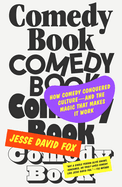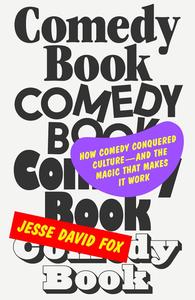
 Early in Comedy Book, journalist Jesse David Fox quotes from a 1941 article by legendary New Yorker writers E.B. White and Katharine S. White, who caution against the effort to explain how humor works. The Whites might come to a different conclusion after reading Fox's smart and comprehensive survey of the world of modern comedy.
Early in Comedy Book, journalist Jesse David Fox quotes from a 1941 article by legendary New Yorker writers E.B. White and Katharine S. White, who caution against the effort to explain how humor works. The Whites might come to a different conclusion after reading Fox's smart and comprehensive survey of the world of modern comedy.
Fox, a senior editor at Vulture and its comedy critic, also hosts the podcast Good One: A Podcast About Jokes. It's clear he's spent a substantial portion of his adult life in comedy clubs, while consuming thousands of hours of comedy on television and digital platforms. Fox focuses in Comedy Book on the early 1990s to the present, and presents the idea of "play theory," which means that comedy is "not simply about jokes, but is part of the broader human condition born out of the evolutionary need for play." In this framework, comedy is "less of a discrete moment and more of a state of being."
Organized thematically, Comedy Book ranges widely over the comedy landscape, engaging with subjects that include timing and how soon is too soon to be joking about tragic events (Saturday Night Live's response to 9/11); comedy and politics (Jon Stewart and The Daily Show); the role of truth and authenticity in comic performance (the career of Louis C.K., whose popularity plummeted in 2017 after allegations of sexual misconduct); and even whether something has to be funny to qualify as comedy. (Adam Sandler fans, take note.)
Though he writes about some of the era's greatest comic talents--Jerry Seinfeld, Chris Rock, Dave Chappelle--and groundbreaking comic shows that include SNL and The Simpsons, Fox doesn't dwell exclusively in this lofty territory. Anyone unfamiliar with the explosion of comedy on the Internet or the innovative ways comedians from marginalized groups advance their careers will be better informed about those subjects after Fox's discussion. His book includes copious footnotes, with references to his journalism and podcast episodes and to other sources that illuminate his themes.
Fox concludes with a deeply personal story to illustrate how comedy rescued him from an episode of profound grief and, later, the pandemic. For him, comedy is much more than a source of entertainment: it's an essential way to connect to other human beings and, ultimately, build community. It's an art form that "can be taken seriously," he argues. "It must." Above all, his thoughtful book is proof positive that comedy truly can be a lot funnier if you really understand the joke. --Harvey Freedenberg, freelance reviewer
Shelf Talker: In Comedy Book, Jesse David Fox serves as a knowledgeable and informative guide to the world of contemporary comedy, and its diverse practitioners and forms.

